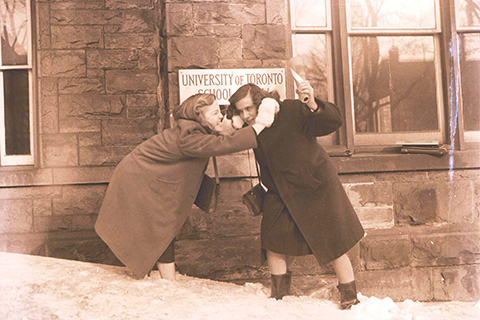In 1947 two law students named Pat Teney and Babs Flint staged a mock fight outside the law school to provide evidence for a moot court, a simulated trial. The student press covered the event with avidity, devoting no fewer than eight articles to the story, and climaxing with a true tabloid teaser: “Law Babes Brawl… Ousted Queen, Bitten and Scratched By Blonde Spitfire.”
These days moots are much more serious business. They give students an opportunity to practise their oral advocacy skills in front of a discerning audience that sometimes includes judges from Canada’s highest courts. Every law student participates, and especially enthusiastic mooters often compete at the national and international levels.
But Teney and Flint may have had more fun. It all started after Teney won a popularity contest – “The Girl We Would Most Like To Be Called To The Bar With” – and Flint, who came second, pretended to be outraged. She told a Varsity reporter Teney had packed the poll with her friends and called her a “cheap chorus girl” and an “insignificant freshie.” Within days, the two former friends were punching, scratching and pulling hair in front of the law building (then on St. George Street).
Accusations flew and the two women agreed to settle their differences in a moot court held March 5, 1947, in the Junior Common Room of University College. They were each represented by two student lawyers.
These days, mooters are judged on performance and a verdict isn’t always given. But in 1947, the court handed down a swift and somewhat surprising bit of justice. After deliberating for 14½ minutes and hearing from at least eight witnesses including a “pseudo-psychoanalyst” and actress Charmion King (BA 1947 UC), the jury acquitted Flint of libel and slander, but convicted Teney of assault. Her punishment? The purchase of two tickets to the law school’s 60th-anniversary banquet at a cost of $2.50 each.
Recent Posts
People Worry That AI Will Replace Workers. But It Could Make Some More Productive
These scholars say artificial intelligence could help reduce income inequality
A Sentinel for Global Health
AI is promising a better – and faster – way to monitor the world for emerging medical threats
The Age of Deception
AI is generating a disinformation arms race. The window to stop it may be closing





